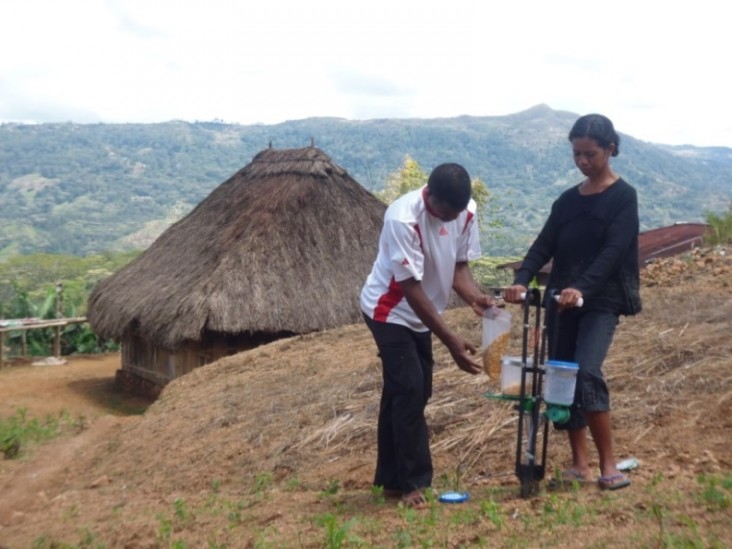|
Purpose: To enhance household food and nutrition security and improve rural livelihoods through a reduction in crop losses caused by the increasing frequency and severity of droughts. |
Location: Baucau, Ermera, Manatuto and Manufahi Districts. |
|
Partner: Food and Agriculture Organization of United Nations (FAO) |
Duration: April 2013 – April 2015 |
|
Cooperative Agreement: $xx |
Background:
Over 80% of Timor-Leste’s total population relies on subsistence farming. Rural farmers across the country are faced with considerable constraints, including poor climatic conditions, flooding and erosion, droughts, limited access to improved inputs and markets and limited knowledge of agricultural best practices. In addition, Timor-Leste suffers from rapid land degradation due to its mountainous topography, extreme and changing weather conditions and deforestation and other unsustainable practices that negatively affect the country’s arable land. To respond to periodic natural disasters, the Government of Timor-Leste (GOTL) has requested assistance to address land degradation and low crop productivity in the uplands of the country. U.S. assistance with research and development in agricultural Climate Change Adaptation (CCA) initiatives, such as conservation agriculture, will help Timor-Leste to better respond to natural disasters, particularly drought.

Summary:
USAID’s Enhancing Food and Nutrition Security and Reducing Disaster Risk through the Promotion of Conservation Agriculture grant enhances household food and nutrition security and improves rural livelihoods through a reduction in crop losses caused by the increasing frequency and severity of droughts, associated with climate change and variability, and leads to a more sustainable increase in agricultural productivity of the Timorese farmers.
USAID’s Enhancing Food and Nutrition Security and Reducing Disaster Risk through the Promotion of Conservation Agriculture grant identifies, tests, and validates new and improved agricultural conservation technologies and practices on the ground. Also, the grant trains District Senior Extension Workers, Sub-district Extension Worker Coordinators, NGO workers, subject matter specialists, master trainers, and social mobilizers to work with farmers across Timor-Leste on agricultural conservation. Through this grant, USAID procures and delivers packages of farm tools, machinery and implements, planting materials, farmyard manure, organic compost, etc. to farmers, which are required to replicate and up-scale the new and improved conservation agriculture technologies. In addition, USAID’s Enhancing Food and Nutrition Security and Reducing Disaster Risk through the Promotion of Conservation Agriculture creates awareness among policy-makers of the GOTL and relevant ministries through linking them with appropriate institutions and specialists in Indonesia, with similar agro-ecological conditions, that has witnessed considerable success in conservation agriculture. Moreover, through this grant, USAID helps develop public-private partnerships to initiate supply chains for conservation agriculture inputs and marketing chains for the anticipated surplus crop production. Since the inception of the grant, farmer groups in targeted communities have reported up to 40% reduction of time needed in producing maize with conservation agriculture techniques. Around 400 farmers and 30 technicians from GOTL and other agencies gained knowledge on conservation agriculture techniques and are aware of the potential of those technique to increase and maintain sustainable production throughout the year.








Comment
Make a general inquiry or suggest an improvement.